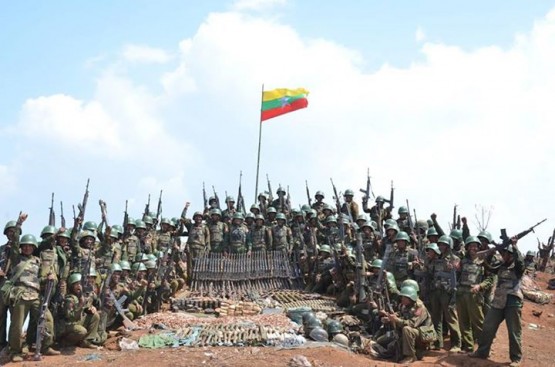A recent report in Burmese state-run media indicating that Canadian officials have been having discussions with their Burmese counterparts regarding future military cooperation between the two countries has raised alarm bells among Karen and Kachin refugee communities in Canada.
Global New Light of Myanmar reported that during a 19 September meeting between Canada’s outgoing ambassador to Burma, Mark McDowell, and commander-in-chief of the Burmese armed forces Snr-Gen Min Aung Hlaing, the pair discussed a range of issues involving Canadian-Burmese relations, including “the promotion of [relations] and cooperation between the two armed forces”.
The Kachin Canadian Association (KCA), an organisation representing a large number of the Kachin community in Canada, a majority of whom are resettled refugees, responded in an open letter to Canadian officials, warning that such cooperation would be premature.
“Given that Burma’s army, known as the Tatmadaw, is currently engaged in an ongoing conflict in northern Burma, in which army troops have repeatedly carried out serious abuses, including rape and summary executions of civilians, we do not believe that such cooperation should be considered until and unless the Army is fully placed under the control [of a] civilian government; premature collaboration would only help entrench the generals who consider themselves above the law and beyond the control of democratic elected civilian leaders,” said the KCA.
The organisation’s statement came out at the beginning of the week, just ahead of a series of unprecedentedly large demonstrations in state capital Myitkyina opposing the ongoing army offensive in northern Burma against the Kachin Independence Organisation (KIO).
The response from the Karen Community of Canada (KCC) – which highlighted the Tatmadaw’s ongoing campaign against a splinter faction of the Democratic Karen Benevolent Army that in recent weeks has displaced more than 5,000 civilians in Karen State – similarly warned against such cooperation.
“We remind Canada that the Burmese military is guilty of rampant human rights abuses in ethnic areas, including rape, destruction of civilian villages, extrajudicial killings, torture and forced labour. There are few signs that the Burmese military has reformed, as it continues to carry out violent attacks on ethnic resistance forces, not only in Karen areas, but also in ethnic Kachin, Shan, and Ta’ang territories as well”, the statement said.
In an interview published in the Global New Light of Myanmar on 6 October, Canadian Ambassador Mark McDowell spoke at length on the topic of Burma’s armed forces. “The military here wants to become more of a modern, professional force, and that means having access to international standards of training; and I think also [the military] has suffered from isolation in the same way some sectors of the economy did,” he said. “They want to have access to global standards of hardware and software, and I think that would be a great thing if they become more of a cosmopolitan organisation. One area of cooperation came about because Canada has significant support for counter-terrorism and anti-crime capacity building.”
As McDowell also pointed out in his interview, Canada does not have a military attaché in Rangoon at this point, unlike other nations such as Australia, the USA and the UK, all of whose militaries are currently engaged at some level of cooperation with Burma’s armed forces, mostly giving courses on humanitarian issues and military professionalism.
[related]
The issue of further Western military cooperation with their Burmese counterparts will likely continue to be a contentious one for refugees resettled in third countries like Canada – after all, most of them were forced from their homes by the perpetrators of the bloody conflict.
Burma’s military machine, which under the current Constitution is not under the control of the civilian government, stands accused by rights groups of continuing to engage in widespread human rights abuses against civilians during its campaign against ethnic armed groups such as the KIO. A recent report by the Palaung [Ta’ang] Women’s Organization (TWO) accuses the army in its ongoing offensive against the Ta’ang National Liberation Army of “committing war crimes, on a widespread, systematic basis – in particular, torture, shelling of civilian targets, and forcing civilians to be porters and human shields.”
While many rights groups oppose increased cooperation between Western and Burmese militaries, other voices have suggested that such cooperation will help improve the Tatmadaw’s rights record.
William C. Dickey, who recently served as the US defense attaché to Burma, advocated for the Pentagon to expand its engagement with the Burmese army from its currently limited level. “With its high standards and long democratic tradition, the US military is well suited to help in the transformation process, to help Myanmar’s military understand its proper role in a democratic society,” said Dickey in an op-ed published by Nikkei Asian Review.
Karen group questions Canadian diplomats meeting with controversial crony
Other issues, such as the possibility of Western firms doing business with those Burmese who were previously blacklisted by sanctions, are also matters that concern resettled refugee communities in Canada, according to the KCC. The Karen group’s statement drew attention to a recent meeting between a Canadian trade official and a controversial businessman linked to Burma’s drug trade.
“In July, the Canadian Embassy to Burma posted on its Facebook page that the embassy’s trade team had met with U Aik Htun to discuss potential business opportunities,” the KCC statement noted. “This same individual has been cited by the US Treasury Department as ‘having connections with the narcotics trade,’ so we are wondering why the Canadian Embassy is dealing with him. We do not believe that Aik Htun or Steven Law, another dubious business figure associated with the drug trade who traveled to Canada in 2014 as part of a trade delegation, should be interacting with Canadian trade officials.”



